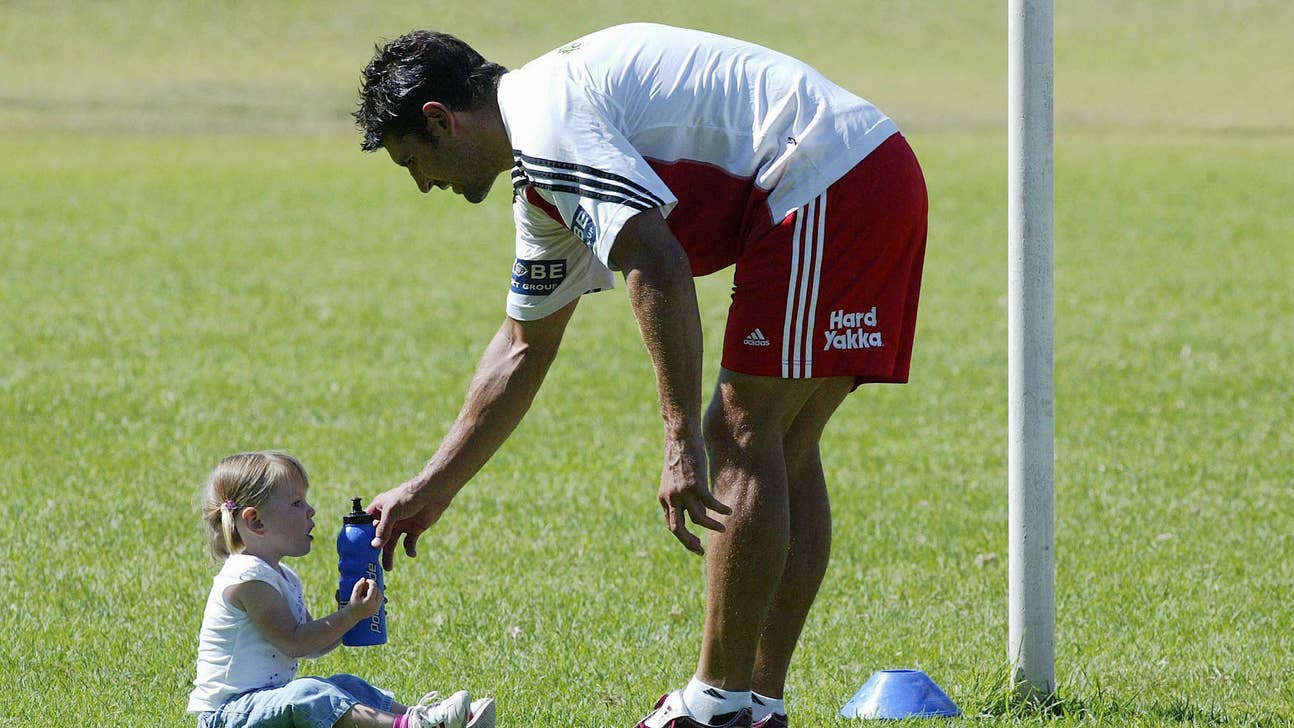
A Father's Day guide on how to avoid being a crazy sports dad

1. Your child isn't going to be Tom Brady, LeBron James, Bryce Harper, Serena Williams, Jordan Spieth, Michael Phelps, Usain Bolt, Sidney Crosby, or, if you're an American, a famous soccer player.
Get that out of your head now. The reason you enter your five-year-old in tee ball or throw your six-year-old into the pool isn't because you're angling for a future endorsement deal. It's because sports are a great way to keep your child physically active, teach accountability and learn a number of life skills such as winning the right way, coping with failure and how to get along with others.
Sports are supposed to be fun and are not a means to an end. Sure, if your child gets to junior year and is good enough where a college scholarship might be on the table, then you can start shifting focus from sports making for a well-rounded childhood to sports being a ticket to some money off a $200,000 education. But if you start thinking that too early, all you're going to do is set yourself up for multiple forms of disappointment.

2. It's not about you.
It's an old, tired cliche: the father living vicariously through his son (or daughter) to capture some of the sports magic that eluded him in his day. And while that nonsense certainly happens, it's not as common as sitcoms or Oprah reruns might have you believe. What you do see are parents taking the sport more seriously than their child. They know who their kids have to beat to get on the traveling team. They know the All-Star cuts that allow you to make a big swimming or track meet. They know who you're playing in the semifinals because they stayed to watch a random tennis match while you went to lunch. They've watched the Lifetime movie Fab Five: The Texas Cheerleader Scandal and related a little too much. It's an epidemic and the majority of dads (and moms) who do this don't even realize. So here's a tip: Put on one of those godawful pageant shows on TLC, where the creepy moms dress the five-year-old girls like Barbie dolls. Watch the whole thing, no matter how disgusting it is. Then step back, look in a mirror and realize that's basically you, except sashes are replaced with trophies and there's a whole lot less makeup. Congrats; you're a stage mom.

(TIMOTHY A. CLARY/AFP/Getty Images)
3. You're not the coach (unless you're the coach.)
It's okay to give some pointers to junior if you're outside throwing the ball or shooting hoops or kicking around the ol' soccer ball. In moderation, these tips can be helpful. (In moderation. When you're playing golf with your child, don't give them 20 tips the first time around. Offer one and then, when they're ready, maybe come in with a second. Everything else is just white noise.)
But when it's time for practice or a game/meet/tournament? That's the coach's time. Let the coaches do their thing. It doesn't matter that you were a shooting guard on your JV basketball team. No one cares that you and Al Bundy once connected for four touchdown passes. Even if you were a coach of the same sport for a dozen years, who cares? A coach has his or her own methods, strategies and teaching tools. Don't overstep your bounds with advice that might be contradictory. (That doesn't mean all coaches are good. If you find yourself not liking one, feel free to switch.) Just don't be the hoverer. Even if it's a parent-coached rec-league team, just back off. If you cared so much about giving input, maybe you would have donated your time. And if you did and serve as your nine-year-old's soccer coach, it's okay to teach because you've flipped the switch from dad to coach.
Oh, and never bother a real coach during practice. They hate that slightly more than when you bother them after practice.

(Gregory Rec/Portland Press Herald via Getty Images)
4. Be a parent and make your kids do things they don't always want to do.
Overheard at my office (Starbucks) this week: "Is [redacted] at swimming? "No he didn't like practice so we quit. He's at a friend's house playing video games."
You should never force your kids into playing a sport, instrument or Maria in West Side Story. But they're still children and you're still a parent. So you nudge. You cajole. You push. You barter. You make non-threatening threats. There's a fine line between forcing something and being a dad who lets the seven-year-old wear the pants in the family. Sometimes we have to make our children do things they don't want to do, like eating vegetables, visiting their creepy cousins and, yes, going to their extracurriculars. So, no, you can't skip swim practice this week. You made a commitment. And because my mom and dad wouldn't let me skip swim practice when I was eight, I quickly grew to love the sport, staying heavily involved with it until I was 30. I made some of my best friends because of it, learned how to win with grace and lose with slightly less grace and, most importantly, taught myself that at the end of the day the only thing way you get anywhere is through hard work, dedication and occasionally pulling on a lane rope during a really tough set. Kids don't know what's best. It's your job as a father to set them in the right direction.
There's a line that you don't want to cross though: Never push your child too hard in a certain direction. It's a situation ripe for a backlash. If you want Junior to follow in your footsteps as a wrestler, put him in wrestling, encourage him and let him come to his own realization that he loves the sport. It's like that old saying about crushing the dove or something.

(Kamil Krzaczynski/NBAE via Getty Images)
5. Keep a healthy rotation of sports until your child hits 13, at minimum.
Specialization is hurting American sports. Kids are picking their main activities earlier and earlier, which only leads to burnout, apathy and injury and still doesn't make us do any better at the Cups, both Ryder and World. Thus, you should keep your star golfer on the spring lacrosse team. Don't start playing AAU ball at eight. Great at soccer? Stay on the track team too. Playing a few sports and excelling at one draws a nice line between what's serious and what's frivolous. And anyway, playing one sport for fun can have a positive effect on the sport you play well. (Our theoretical running soccer player is going to build endurance and learn how to actually run.)
A well-rounded sporting youth doesn't include six hockey practices a week, it involves one or two hockey practices,some swimming and soccer, all between playing pickup basketball with friends, going to lacrosse camp, taking piano lessons, playing outside and staying up late to watch Cinemax. (Do kids still do that?)

(JIM WATSON/AFP/Getty Images)
7. Put your child in at least one individual sport.
Team sports are great and should be a staple of a well-rounded sporting life. But rec-league level youth soccer or basketball can easily get kids lost in the shuffle. They hang around under the basket, occasionally getting startled when the ball comes to them, walk around aimlessly for most of the time and then feel satisfied after a game because their team won. You could come off the court, rink, diamond or field (no, when there are oranges served at halftime, it's not called a "pitch") without having done anything. In the end, you've exerted the same lack of physical effort that you do in non-sports such as playing clarinet, reading or diving.
That's where the individual sport comes in? In swimming, tennis, golf, wrestling - I'm sure I'm forgetting others - the results don't lie. There's no rationalizing the numbers on a stop watch. You can't delude yourself when you're losing 6-0, 6-0. The only way to deal with repeatedly getting pinned is to work harder so you can get better. All sports teach a sort of responsibility, but when it's just you out there, there's nowhere to hide. That's a good thing.

8. Get across that losing is okay without getting across that losing is okay.
Losing is a part of life. We all do it, whether in school, sports, jobs, relationships, as members of the Cleveland Browns, whatever. Learning to lose is one of the most important parts of sports. Since our school culture has basically eliminated the idea in place of an "up with people!" world in which everybody is a winner, sports are the best place to teach that lesson. And while nobody wants to lose it's an acceptable outcome. When it happens and your child is crying/angry/frustrated, there's only one question to ask: "Did you give 100%?" If the answer is "yes," then there's no reason for anyone to be upset. If the answer is "no," then it's time for a Full House-style lesson.
Victories should be celebrated, but not dwelled upon. Losses, depending on the age, sport and skill of an athlete, are to be treated as an exciting step in the right direction (a seven-year-old finishing last in 25 freestyle), a call to do more in practice (a 10-year-old who didn't shoot well in her basketball game) or a disappointment that shows us some days are better than others (an accomplished tennis player who lost a winnable match).

(Dustin Bradford/Getty Images)
9. Don't be that guy.
You know that guy. You've seen that guy. You've rolled your eyes at that guy. But there's a fine line between any sports parent and that guy. Don't cross it. The instant you start to make sports not fun for your child, then you've become him.

(Peter Bischoff/Getty Images)
10. When all else fails, let mom handle it.
That's just good advice for life.
